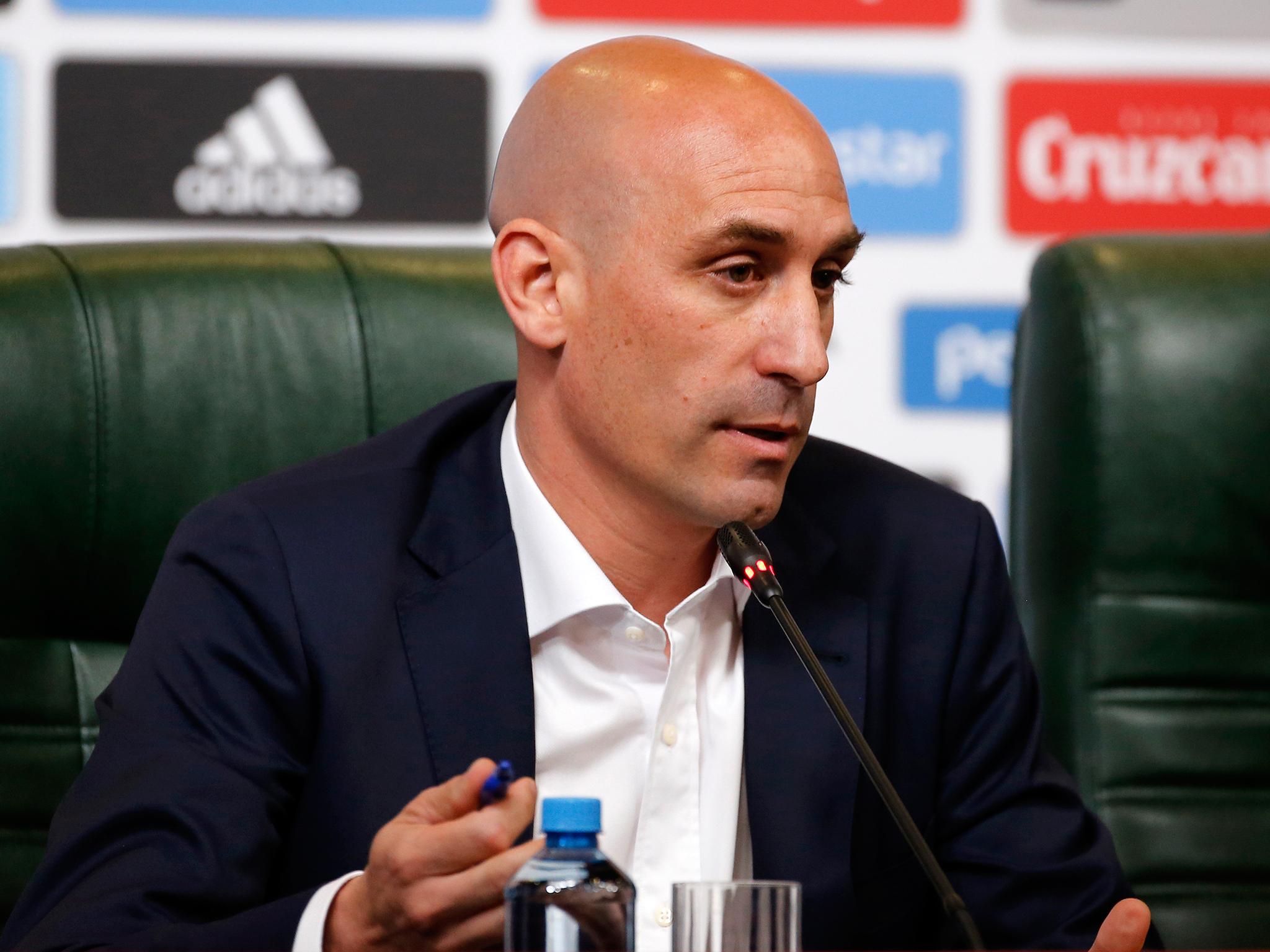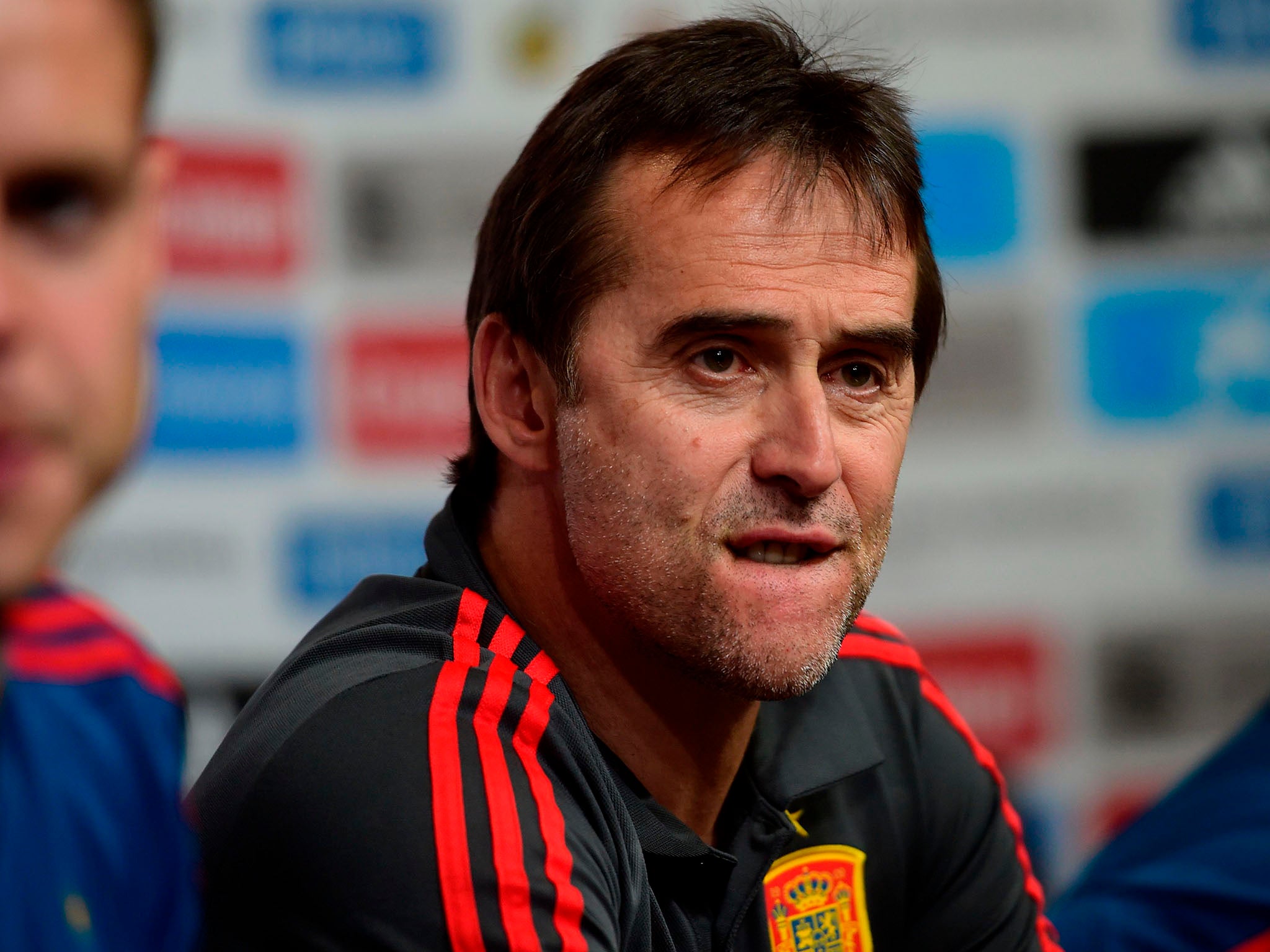World Cup 2018: Presumptuous Julen Lopetegui and the arrogance of Real Madrid meant he simply had to go
Madrid have treated the national team like they’re just another club who can be bullied into doing what Florentino Perez wanted, leaving Luis Rubiales with no other option
In the time his return tickets from Krasnodar to Madrid were being sorted on Wednesday evening, Julen Lopetegui and those closest to him were emotionally discussing why exactly it was that Luis Rubiales had taken the decision to sack him – including some mutterings that it was an act of reprisal for not voting for the president in the federation elections – but the blame resoundingly lies in two places: the naive presumptuousness of Lopetegui himself, and the astonishing arrogance of Real Madrid.
There is of course a fair argument that Spanish Football Association [RFEF] president Rubiales got too angry about it all and then went way too far, but he didn’t really have that far to go. Madrid and Lopetegui had put him in a very difficult position with precious little room to manoeuvre, yet pretty much ensuring he had to act.
The way the Bernabeu hierarchy went about the business of ultimately appointing Zinedine Zidane’s replacement was that poor, that insulting, that dismissive of the national team they are supposed to naturally be linked to.
That’s what it boils down to. Lay out the details. Just a month after signing a new contract and a mere week before the first World Cup fixture against Portugal, Lopetegui was taking time out from preparations to undertake secret negotiations with a club to meet his release clause after the end of the tournament.
That in itself might have been fine had he kept everything above board and maybe at least let the federation know he’d had an approach, but he did not. The first Rubiales found out about it was a mere five minutes before the announcement, and then he couldn’t even get his employee on the phone. When Rubiales eventually pleaded for more time to sort something – maybe even make a counter offer – it was pointless. It was too late.
He had nowhere else to go.
There’s been a lot of talk that the eventual decision to sack Lopetegui was all about Rubiales saving face, and that’s undoubtedly part of it, but far from the whole part.
In any other normal business – let alone one so literally results-based, with everything that entails, as well as the unique Barca-Real duopoly – such a sequence of events would have led to a similar conclusion as Rubiales’.
It could be argued that this is far from a normal situation since Spain have such a good chance of winning sport’s greatest prize, something that is the ultimate remit of Rubiales’ job, so he should have been pragmatic rather than principled, but then why doesn’t that apply to those at the Bernabeu? Why could they not have gone about things in a different way, rather than the Madrid way? It's tempting to wonder how it might have been perceived had Barcelona done this, especially given the political situation right now.
Madrid have by contrast always seen themselves as Spain’s national club, creating a link with the national side to the point president Florentino Perez got agitated that there were a majority of Barcelona players crucial to the country’s 2008-12 golden era. He made it one of his missions to ensure that the Madrid side had enough high-quality Spanish players in it so they would be most associated with the national team in future.

It is someway ironic that the role of those seven Bernabeu players – especially Sergio Ramos – has been called into question, and it is so pointed that Perez’s patriotic pride only went so far.
The Bernabeu president evidently had no concern for the potential negative effect of all of this on the national side, just for the image of Madrid.
Perez ultimately went about this in the normal way that Madrid do, brashly and assertively, as if the Spanish team were just another club that should bow down to the power of the Bernabeu. Strategic leaks to the press and public pressure campaigns are usually the way they go about destabilising players to sign them, and it was telling that media closest to Madrid like Marca were so soft in their analysis of Wednesday’s sensational developments. If only Perez himself had displayed such lightness through all this, a mess might have been avoided.
This was what should be so frustrating for the Spanish federation, and the public. Madrid could still have got their man – albeit the sixth on their list of targets – and Lopetegui could still have had his shot at a World Cup, had they approached the situation with the delicacy and decorum that being so close to the competition required.

They could have handled it with a bit more tact, could have gone fully above board. They could have taken special care and departed from their usual mode of business, due to the special situation and what should be a special relationship with the national team.
Most galling and potentially Parthian of all is the detail from a typically brilliant report from El Pais’ Diego Torres, that Madrid wanted to announce the appointment as soon as possible, because they always want to present a “winning” project – and at this point Lopetegui has never lost a game with Spain.
That might of course have drastically changed had they suffered a disappointing World Cup, and the reported feeling at the Bernabeu was that it would be worse with every day they let it go without an announcement.
They evidently didn’t care for whether that might destabilise the national team. Superficial posturing was far more important for a club that has just won three Champions Leagues in a row. Remarkable.
And what of that posturing? It’s not all that striking.

Madrid will not be presenting a “winner” as their new manager, given Lopetegui’s only feat was achieving the qualification that Spain always should. They will instead be presenting the manager now infamous for leaving his national side on the eve of the World Cup in one of the competition's most sensational stories.
That is what he is likely to be remembered for, rather than the immortality that could have come from winning the sport’s greatest prize. He is now unlikely to get that chance again with his own country, but has also put so much more pressure on himself at the Bernabeu.
Lopetegui had really better succeed there, if nothing else to make the stain of this sorry story go away.
But even his appointment at Madrid has already soured, just like this whole affair.
What must Lopetegui be thinking now?
For Rubiales, though, it all meant he could only really think in one way.
His former employee, and his country’s greatest club – at least in terms of trophies – left him with nowhere else to go. The manager just had to go.
Join our commenting forum
Join thought-provoking conversations, follow other Independent readers and see their replies
Comments
Bookmark popover
Removed from bookmarks